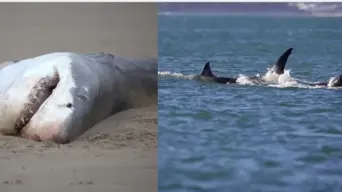Orcas, humans linked to decline of the great white sharks in and around the False Bay coast
Morgan Van De Rede
14 July 2025 | 4:00False Bay and Gansbaai were once known as 'white shark capitals' but marine researchers have found, in the last decade, there's been a visible drop in sightings and numbers of these sharks in these areas.

CAPE TOWN - Orcas and humans have been linked to the decline of the great white shark population in and around the False Bay coast.
False Bay and Gansbaai were once known as "white shark capitals" but marine researchers have found, in the last decade, there's been a visible drop in sightings and numbers of these sharks in these areas.
Killer whales are known to hunt sharks and eat their livers, but there are other factors contributing to the decline
Marine biologist Amy Webber said that climate change has no doubt contributed to the decline of great white sharks along our coastline.
“Our climate is currently undergoing warming, and with that, marine ecosystems are being altered globally. These changes do affect sharks with the reduction in suitable habitats as temperature changes and consequent movement of their food sources do as well.”
Webber adds that humans have a far greater effect on sharks than any natural predator because of non-selective fishing methods.
“The reduction of shark species will almost inevitably cause disruptions known as the top-down trophic cascade. These sharks monitor and control their prey populations and strengthen further predator-prey relations, which trickle all the way down to primary producers of the food web.”
Get the whole picture 💡
Take a look at the topic timeline for all related articles.














